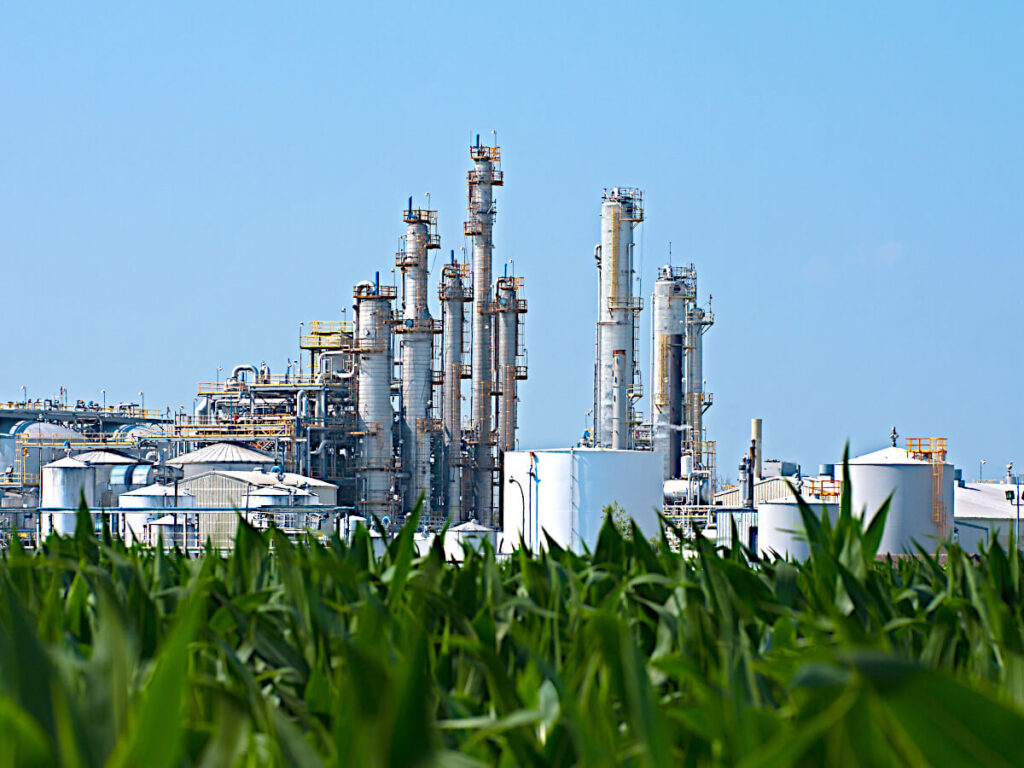Biofuels
Biofuels, considered renewable energy sources, are a category of fuels derived from biomass such as plants, algae, or animal waste. The two most common biofuels are ethanol and biodiesel. Renewable supply of these materials is essential for a sustainable fuel supply and assists with the circular economy.
The Renewable Fuel Standard (RFS)
The Renewable Fuel Standard (RFS) program requires a specified volume of renewable fuel to replace or reduce the quantity of petroleum-based transportation fuel. The EPA is currently finalizing changes to the Renewable Fuel Standard program. Proposed volume requirements by category would lead to significant industry growth in 2024 and 2025 (see table).
Volume (billion RINs)¹
¹One RIN is equivalent to one ethanol-equivalent gallon of renewable fuel (Source: EPA)
| 2022 (Current) | 2023 (Proposed Targets) | 2024 (Proposed Targets) | 2025 (Proposed Targets) | |
|---|---|---|---|---|
| Renewable Fuel | 20.63 | 20.82 | 21.87 | 22.68 |
| Advanced Biofuel | 5.63 | 5.82 | 6.62 | 7.43 |
| Biomass-based diesel | 2.76 | 2.82 | 2.89 | 2.95 |
| Cellulosic biofuel | 0.63 | 0.72 | 1.42 | 2.13 |
| Supplemental Standard | 0.25 | 0.25 | ||
| Total | 29.9 | 30.43 | 32.8 | 35.19 |
| Proposed Annual Increase | 1.8% | 7.8% | 7.3% |
According to the Advanced Biofuel Association, advanced biofuels, as defined by law, are renewable fuels that achieve ≥50% lifecycle greenhouse gas emission (GHG) reductions compared to a 2005 fossil-based fuel baseline. Corn starch ethanol does not qualify for this classification. Raw materials such as plant dry matter, nonfood crop feedstocks, agricultural and forest residues, and industrial waste are considered advanced biofuels.
Renewable fuel is a strategic initiative in the United States. Energy dependence and cleaner fuels have led to subsidies and tax credits to support industry investment and growth.
Why the Biofuel Industry Needs Air Pollution Control
The manufacture of biodiesel and ethanol emits VOCs, Particulate Matter (PM), and odiferous compounds. The production of ethanol includes many processes that potentially negatively impact air quality. Large-fired boilers, typically fossil fuel-based, are necessary for heating materials. Fermentation, distillation, and dehydration processes also emit VOCs which typically require control using a thermal oxidizer, a wet scrubber, or an enclosed flare.
Renewable fuel produced via biomass may lead to particulate emissions during the drying and pre-processing activities. Further refining and storage of the fuel generate VOCs in systems that are not closed-loop. Advanced biofuels are critical technologies necessary to achieve net zero emissions.
APC Technologies Applicable to Biofuel Operations
Some of the more common technologies deployed for various problems in the biofuels industry are listed below:
- Regenerative Thermal Oxidizers – appropriate with large-volume, low-concentration streams such as those found in Ethanol production.
- Direct-Fired Thermal Oxidizers with heat recovery – direct-fired thermal oxidizers are reliable and robust for treating particulate-laden exhaust streams; however, low VOC-containing streams lead to high gas usage, which needs some form of heat recovery (i.e., heat exchangers or waste heat boilers) for this to be economical.
- Particulate Scrubbers – venturi and multi-vane scrubbers are good options for handling particulate from drying and processing operations
Need Emission Control for your Biofuels Production Process?
Our technical team will work with your company to understand the holistic needs of the facility and ensure the solution chosen is the most appropriate system for your process.


